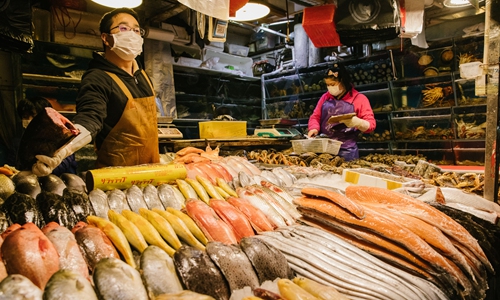Tianjin coronavirus case may arise from frozen food: expert
By Xu Keyue Source:Global Times Published: 2020/6/18 18:28:41

A seafood vendor solicits customers in Beijing's Sanyuanli Market in February. Photo: Li Hao/GT
Virologists said Thursday that the COVID-19 case reported on Wednesday in North China's Tianjin Municipality may have come from frozen food contaminated by the coronavirus, as the patient had cleaned frozen seafood in a hotel.Scientists urged local medical authorities to sequence the genetic code of the virus.
The patient, a 22-year-old man working in the city's Conrad Hotel, has washed dishes in the hotel since May 30, occasionally cleaning frozen seafood.
The Tianjin Center for Disease Control and Prevention said that the man had no travel history in the 14 days prior to the onset of his illness, and no history of contact with confirmed or suspected cases.
According to netizens' tip-offs and online information, seven employees from the hotel went to Beijing recently, but none visited the Xinfadi Market, which is linked to many of Beijing's latest cases . None had close contact with the patient.
Meanwhile, this case of unknown origin has triggered concern. Many netizens speculated about the infection source and worried about a second wave of the epidemic in the city.
"How did the local infection emerge? Why does the virus keep cropping up?" wrote one.
"Is seafood the original source? The epidemic in Wuhan also broke out at a seafood market," asked another netizen.
Yang Zhanqiu, a deputy director of the pathogen biology department at Wuhan University, told the Global Times on Thursday that the patient was more likely to have been infected by frozen food or the ice used to freeze it. If either of these was contaminated by the coronavirus, it could survive for weeks or longer in a wet, chilly environment.
"For example, at -20 C to -30 C environment, the virus could live for months or even years," Yang said.
Yang urged local authorities to conduct genome sequencing to confirm if the virus carried by the patient was of the same origin as that in Beijing.
"If yes, the frozen seafood touched by the Tianjin patient could be of the same batch, with those shipped to Beijing Xinfadi Market. And it is safe to say that this batch of seafood, or the ice used to freeze it, was contaminated by the virus."
It's also possible that the virus was of the same origin as that in Wuhan [Central China's Hubei Province, a region once hit hardest by the coronavirus], and that can't be ruled out," Yang noted. Even so, it's normal for individual cases to emerge after a major outbreak.
Yang warned people not to eat raw food and be cautious when consuming processing frozen food.
China's National Health Commission on Thursday warned the public not to rinse raw meat directly under a faucet to prevent contamination through spattering.
Also, consumers and food workers were told to wash their hands with soap and running water for at least 20 seconds after handling raw meat, poultry and aquatic products.
All the current 93 close contacts of the patient have been quarantined for medical observation. Others are being screened and their workplaces and homes have been disinfected.
Tianjin requires its citizens who had been to medium- and high-risk areas in Beijing in the last 30 days to report to their communities. Those who hide such information and spread the virus will be held accountable, local news reported.
Posted in: SOCIETY